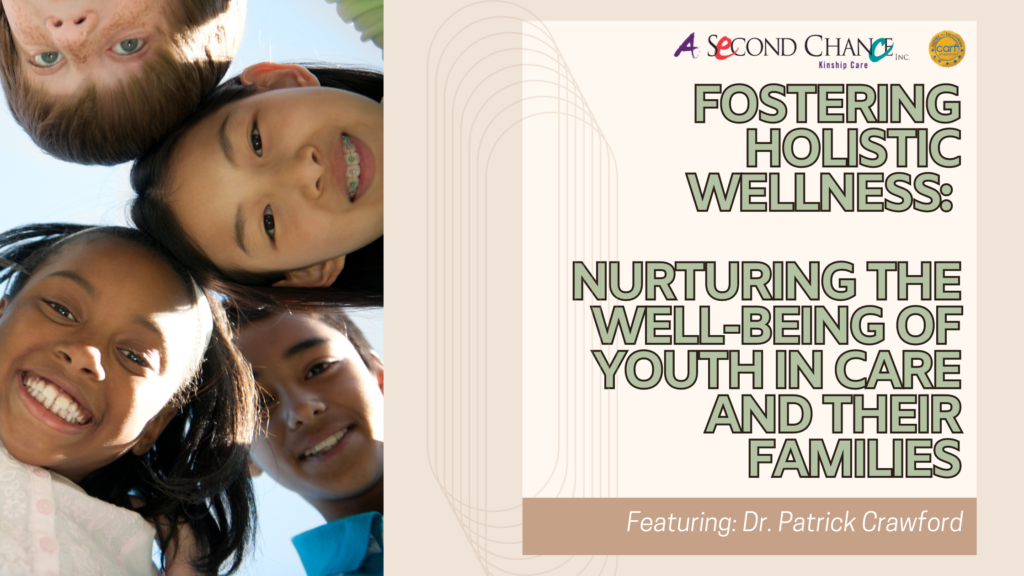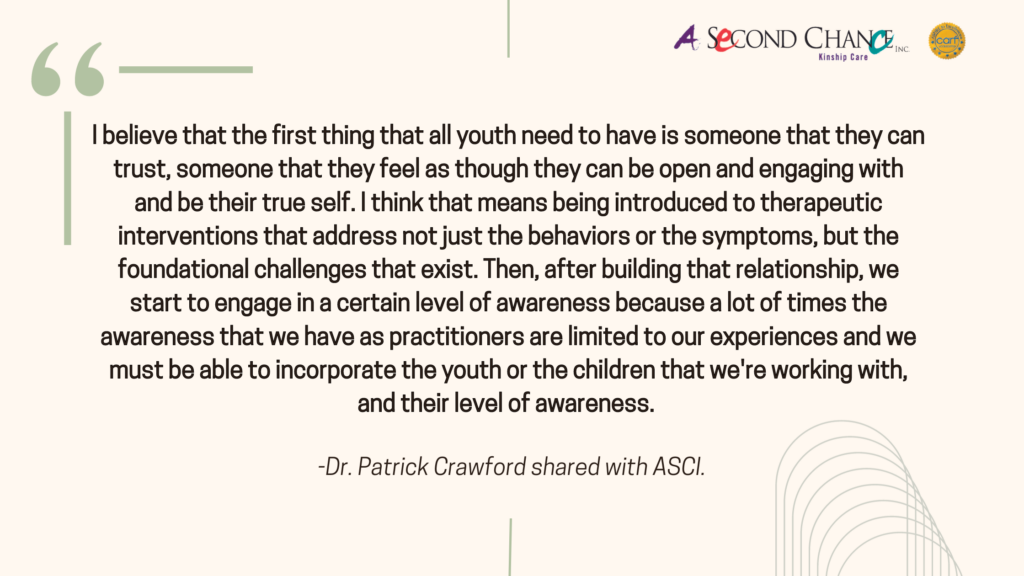Blog
Fostering Holistic Wellness: Nurturing the Well-being of Youth in Care and their Families featuring Dr. Patrick Crawford
Self-Love Month recognizes the significance of prioritizing one’s happiness and overall well-being. This is particularly crucial for youth in care who may be dealing with trauma. Focusing on self-love and self-worth can play a vital role in their healing process.
Youth in care often face unique challenges related to separation, placement changes, and disruptions in their lives. These experiences can impact their sense of self-worth and make it essential to cultivate self-love. Encouraging practices that promote self-care, self-compassion, and positive self-esteem can contribute to the emotional and mental well-being of youth in care.

Holistic wellness for youth in care and their families involves addressing physical, mental, emotional, and social well-being to create a comprehensive and balanced approach to overall health. Considering the unique challenges and experiences that youth in care and their families may face, a holistic wellness approach aims to support them in multiple dimensions.
ASCI had the opportunity to engage in a conversation with Dr. Patrick Crawford, a tenured licensed clinician. His insights into the benefits of therapy for youth in care and the potential for generational healing in child welfare are invaluable.
By embracing a holistic wellness approach, practitioners, caregivers, and communities can collaborate to create a supportive and nurturing environment for youth in care and their families. This comprehensive strategy recognizes the interconnected nature of physical, mental, and social well-being, ultimately promoting positive outcomes for the children and families involved in the child welfare system.
Dr. Patrick Crawford expressed enthusiasm for the topic of holistic wellness for youth and emphasized the importance of addressing various domains in their lives, including mental, physical, spiritual, and emotional attributes. His emphasis on critical factors such as creating a safe environment, meeting basic needs like food and clothing, and recognizing the spiritual and emotional dimensions of trauma underscores the holistic approach needed when working with youth in care. By acknowledging these fundamental aspects, caregivers and professionals can better support the overall well-being of children in challenging circumstances.
Dr. Crawford shared, “When we talk about the spiritual, the mental, the emotional [well-being of youth in care], we really have to assist them with identifying what traumas they’ve experienced and the social-emotional corrective responses that should have occurred during that process that was disrupted when they were removed from the home or they were placed in kinship care.”
The connection between childhood trauma and the child welfare system was acknowledged, with Dr. Crawford proposing a shift towards a more proactive role for child welfare systems. He advocates for education and training to help families and communities understand the roles and objectives of the child welfare system, emphasizing that its purpose is not solely to separate children from their parents.
As a seasoned clinician, Dr. Crawford emphasizes the significance of building trusting relationships with youth and aligning therapeutic approaches with their awareness and challenges. He stressed the need for practitioners to be holistic, addressing the foundational challenges and unrecognized traumas that may lead to maladaptive behaviors. Social-emotional development classes in schools, parenting education for families, and a comprehensive therapeutic model need to go beyond addressing symptoms and behaviors.

Reflecting on his personal experience providing kinship care for his brother and nephew, Dr. Crawford expressed a wish for more proactive support from the child welfare system. He encouraged individuals to seek therapy for healing, recognizing the importance of acknowledging past traumas in the journey towards self-improvement.
ASCI has programs and initiatives centered around mental health for youth in care and their families. By integrating these components into programs and initiatives, we contribute significantly to the holistic wellness of youth in care and their families. It reflects a commitment to addressing mental health in a comprehensive and proactive manner, ultimately leading to positive and sustainable outcomes.
Holistic wellness is a comprehensive approach that recognizes the interconnectedness of various aspects of an individual’s life. Here are some key components that contribute to holistic wellness:
- Physical Health:
- Ensure access to regular medical check-ups, vaccinations, and preventive healthcare.
- Promote healthy nutrition and physical activities to support overall well-being.
- Address any specific health concerns or conditions that arise during the child’s time in care.
- Mental and Emotional Well-Being:
- Provide access to mental health services, including therapy and counseling, to address trauma, stress, and emotional challenges.
- Foster a supportive and nurturing environment that encourages open communication and expression of emotions.
- Implement trauma-informed care practices to understand and respond to the unique needs of youth who may have experienced trauma.
- Educational Support:
- Advocate for and support educational stability, ensuring that youth in care have consistent access to quality education.
- Address any learning challenges or gaps to promote academic success and future opportunities.
- Collaborate with schools and educational professionals to create a supportive learning environment.
- Social and Cultural Connection:
- Facilitate connections with supportive peers, mentors, and positive role models.
- Encourage engagement in social and cultural activities to foster a sense of belonging.
- Promote awareness and appreciation of the child’s cultural background and heritage.
- Family Support and Reunification:
- Provide resources and services to support families in addressing the underlying issues that led to the child’s placement in care.
- Work towards family reunification when appropriate, emphasizing the importance of maintaining family connections.
- Offer parenting support and education to enhance family dynamics and communication.
- Life Skills Development:
- Equip youth in care with essential life skills necessary for independent living.
- Provide guidance on financial literacy, job readiness, and other practical skills.
- Foster a sense of self-efficacy and empowerment through skill-building opportunities.
- Trauma-Informed Care:
- Implement trauma-informed practices across all aspects of care to create a safe and understanding environment.
- Train caregivers, social workers, and professionals in trauma-informed approaches to better meet the needs of youth who have experienced trauma.
- Legal Advocacy:
- Ensure that legal rights and responsibilities are clearly communicated to both youth and their families.
- Advocate for the child’s rights within the legal system and provide support during court proceedings.
- Community Involvement:
- Facilitate community engagement and involvement to broaden social connections.
- Connect families with local resources, support groups, and community services.
- Promote a sense of community belonging and encourage participation in positive community activities.
- Crisis Intervention and Safety Planning:
- Develop crisis intervention plans to address potential challenges or emergencies.
- Ensure that both youth and families are aware of safety protocols and have access to support during difficult times.
Dr. Crawford’s insights underscore the complexity of the issues involved and the need for a comprehensive, multi-dimensional approach to therapy and support for youth in kinship care. Adopting a proactive and holistic approach is crucial when advocating for youth in care. This involves understanding the multifaceted challenges they encounter and addressing not only the immediate concerns but also the underlying factors that contribute to their well-being.
By recognizing the complexity of their experiences, advocates can work towards creating comprehensive support systems that prioritize the holistic development of youth in the child welfare system.